毕业生签证¶
I am an advertising space: Advertising space for lease
UK Graduate Work Visa (Graduate visa) (202209QA)
Restart of UK Graduate Work Visa
Application Process for UK Graduate Work Visa (Graduate visa)
Eligibility for Application
You can apply for the Graduate Work Visa if you meet all of the following conditions:
You are currently in the UK.
Your current visa is a Student visa or Tier 4 (General) student visa (https://www.gov.uk/student-visa). ↗.)
You have studied a UK bachelor's degree, postgraduate degree, or other eligible course for the minimum required period with your Student visa or Tier 4 (General) student visa.
(You can check whether your course is eligible and the length of time you need to study in the UK through the following link: https://www.gov.uk/graduate-visa/course-you-studied) ↗)You have successfully completed the above-mentioned course.
If you do not meet the eligibility criteria for applying for the Graduate Work Visa, you may be able to apply for another category of visa to stay in the UK.
。search link:https://www.gov.uk/check-uk-visa
Visa Validity
The Graduate Work Visa for undergraduate and postgraduate graduates is valid for two years. If you have completed a Ph.D. or other doctoral qualifications, the validity period is three years. Your visa will be effective from the date your application is approved.
Note: This visa does not count towards the period required for permanent residency.
If you wish to stay in the UK for a longer period, you will not be able to extend the duration of the Graduate Work Visa. However, you may be able to switch to a different category of visa, such as the Skilled Worker Visa.
(search link:https://www.gov.uk/skilled-worker-visa)。
For information regarding other categories of visas to stay in the UK, you can refer to the following link:
:https://www.gov.uk/check-uk-visa
How to Apply
You must submit your application online. The application link is:
:https://www.gov.uk/graduate-visa/apply
If your partner and children are eligible, they can also apply to stay in the UK. You can check whether your partner and children are eligible through the following link:
:https://www.gov.uk/graduate-visa/your-partner-and-children
When to Apply
You must apply before your existing Student visa or Tier 4 (General) student visa expires.
Once your education provider (such as your university or college) has notified you that you have successfully completed the course corresponding to your Student or Tier 4 (General) student visa, you can apply immediately without waiting for graduation or receiving a certificate.
As part of the application requirements, you will need to prove your identity and provide the necessary documents.
If an interview is required to verify your identity, your application may take longer. You will be informed if an interview is necessary when you submit your application.
Receiving the Decision on Your Application
Once you have submitted your application online, provided proof of your identity, and submitted the required documents, you will generally receive a decision on your application within eight weeks.
You are allowed to stay in the UK while waiting for the decision on your application.
Application Fees
To apply for the Graduate Work Visa, you will need to:
Pay the visa application fee, which is usually £700.
Pay the IHS (Immigration Health Surcharge) fee, which is usually £624 per year.
For detailed information, please refer to:
:https://www.gov.uk/graduate-visa/how-much-it-costs
social care sector, please check if you are eligible to apply for the Health and Care Worker Visa as an alternative.
This category has lower visa fees, and you are not required to pay the annual Immigration Health Surcharge (IHS). You can check the website at:
:https://www.gov.uk/health-care-worker-visa
If you have entered employment in a public healthcare institution after paying the Immigration Health Surcharge (IHS), you may be eligible for a refund. Please check the website at:
:
https://www.gov.uk/apply-immigration-health-surcharge-refund
The allowed and prohibited activities under the Graduate Visa are as follows:
Allowed:
Engaging in most types of work.
Job searching.
Working as a self-employed individual.
Continuing to stay in the UK with your partner and children, provided they meet the relevant eligibility criteria. For more information, you can refer to the following URL: https://www.gov.uk/graduate-visa/your-partner-and-children ↗.
Volunteering.
Traveling overseas from the UK and returning.
Prohibited:
Applying for most social welfare public funds (refer to the following URL: https://www.gov.uk/government/publications/public-funds--2 ↗) or state pension.
Engaging in work as a professional sports player.
If your application is successful, you will receive a comprehensive list of what is allowed and prohibited under the Graduate Visa.
Studying with a Graduate Work Visa is only allowed when the chosen course does not meet the eligibility criteria for a Student Visa (check if your course meets the criteria: https://www.gov.uk/student-visa/course). ↗.) If your course qualifies for a Student Visa, you should extend your student visa instead of holding a Graduate Work Visa to study.
(search link:https://www.gov.uk/student-visa/extend-your-visa)。
If you are studying or researching sensitive subjects, you may require an Academic Technology Approval Scheme (ATAS) certificate. Please check the following website for more information:
:https://www.gov.uk/guidance/academic-technology-approval-scheme
Obtaining Application Decision and Obtaining an Electronic Visa
If you applied electronically, once you receive notification of the decision on your Graduate Work Visa application, you can use the electronic method (i.e., eVisa) to check your immigration status and prove your rights in the UK.
Please use your UKVI account information to log in to the UK government's official website, GOV.UK, and access the online 'View and Prove' service. This is where you can obtain your electronic visa. The website for accessing this service is
:https://www.gov.uk/view-prove-immigration-status
When logging in to view your electronic visa, you will need to use:
Information from the passport or Biometric Residence Permit (BRP) used during the application.
Your date of birth.
The mobile number or email address used during the application process.
The system will send a login code to you through the provided contact information. If you have updated your identity documents or login information (such as email address or phone number) after submitting the application, you should use the updated information to log in.
You can view your electronic visa on any device, such as a mobile phone, tablet, or laptop.
After logging into the 'View and Prove' service, you can:
View your electronic visa and access the rights you have in the UK, such as the right to work.
Generate a 'share code' to provide time-limited access to authorized individuals (e.g., employers) to validate your immigration status.
Update certain personal information, such as passport number or email address.
If you previously set up your UKVI account using the earlier BRP card, you will need to use that document to log in. However, since that document is now expired, we recommend updating it to your current passport or travel document to ensure continued convenience in using your UKVI account. Adding your current passport or travel document to your account will also help avoid unnecessary delays when leaving and returning to the UK.
You can update your information through the 'Update your UK Visas and Immigration account details' service or by using the 'Update details' feature within the 'View and Prove' service. The website for updating details is
:https://www.gov.uk/update-uk-visas-immigration-account-details
If you are unable to submit your Graduate Work Visa application through the UK Immigration ID Check app and must visit UKVCAS to submit your application, you will temporarily be unable to create a UKVI account. In such cases, if you have received or continue to hold a BRP card, you can still use certain online services to prove your rights without relying solely on paper documents. You can choose to use the 'Prove Right to Work Online Service' (https://www.gov.uk/prove-right-to-work) ↗) to demonstrate your right to work in the UK to employers, and the 'Prove Right to Rent Online Service' (https://www.gov.uk/prove-right-to-rent) ↗) to prove your right to rent in England. In the future, everyone will be able to register a UKVI account.
Traveling to and from the UK
When entering or leaving the UK border, your personal information will undergo electronic verification upon arrival. Individuals with a UKVI account do not need to prove their immigration status every time. To avoid unnecessary delays when traveling, please ensure that you register the document you will be using for travel in your UKVI account. This is crucial. If you plan to use a different document for travel than the one used for your Graduate Work Visa application (e.g., a new passport), you can update your information and register the corresponding new document. When you inform us of this new document through the 'Update details' service, the old document will still be associated with your account. If the old document is still valid, you can choose to use either the old or the new document when traveling. If you have informed us of the new document but are still awaiting confirmation of the account update, if possible, you should carry both the old and new documents when traveling.
If you need assistance with logging in or using online services for immigration status, please contact the UKVI Resolution Centre (official website:https://www.gov.uk/contact-ukvi-inside-outside-uk/y)。
Please refer to the official UK government website GOV.UK for more information on viewing and proving your immigration status.
Restrictions on the Graduate Work Visa
After obtaining the Graduate Work Visa, you may be allowed to engage in additional studies. However, you cannot study courses that meet the requirements for a student visa under the Student Route, and you are not permitted to study in public schools.
Furthermore, you are not allowed to bring new dependents. Individuals who are already in the UK with dependent student status can apply as a dependent of the graduate when applying for the Graduate Work Visa.
The Graduate Work Visa cannot be extended, nor does it count towards settlement. However, if you find suitable employment, you may be able to switch to another category of work visa from the Graduate Work Visa.
Conditions for switching to the Skilled Worker Visa
If you meet the relevant requirements, holders of the Graduate Work Visa may be eligible to switch to the Skilled Worker Visa, which allows you to work in the UK in eligible roles with an authorized sponsoring employer. The Skilled Worker Visa can have a maximum validity of five years and can contribute to settlement rights, meaning you may be eligible to apply for permanent residence in the UK.
The Graduate Work Visa does not count towards settlement rights.
To qualify for the Skilled Worker Visa, you must demonstrate the following:
You have a job offer from an authorized sponsoring employer in the UK with the required skill level as approved by the Home Office.
The salary offered by the sponsoring employer meets the relevant minimum salary threshold (typically either an annual salary of £25,600 or the prevailing wage level, whichever is higher).
Your English language proficiency is at the intermediate level B1 according to the Common European Framework of Reference for Languages.
Please refer to the official UK government website GOV.UK for more information on the Skilled Worker Visa. The website address for inquiries is
:https://www.gov.uk/skilled-worker-visa
Additionally, you may be eligible to switch to other categories of work visas, including the Global Talent Visa and Innovator Visa. Please refer to the official UK government website GOV.UK for more information on these options. The website address for inquiries is
:https://www.gov.uk/browse/visas-immigration/work-visas
Graduate Work Visa Guide PDF
:https://www.gov.uk/government/publications/the-graduate-route-information-for-international-students
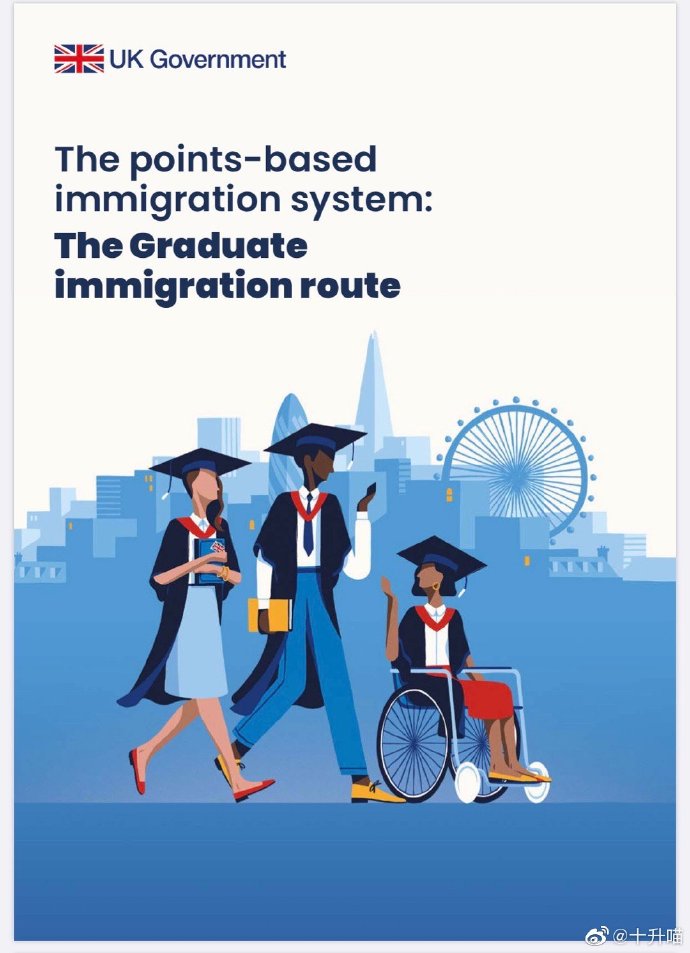
Former UK Prime Minister Theresa May abolished the Tier 1 (Post-study work) visa, which was specifically designed for international students, in 2012.
As shown in the screenshot below, this is an image from the UK Home Office in 2012:
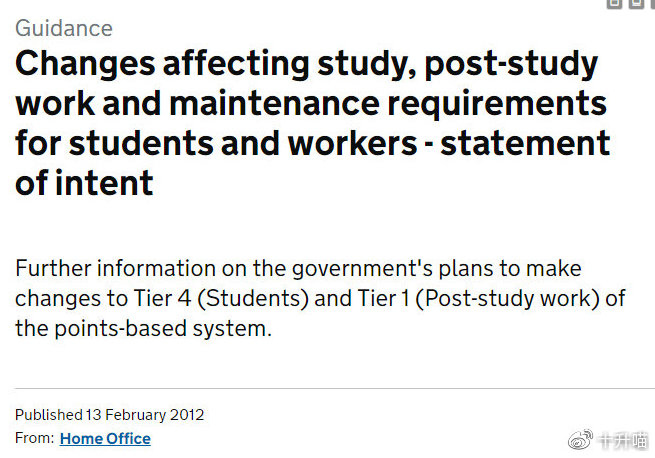
What is PSW?
What is this PSW work visa? PSW stands for Post-study work, which is a type of Tier 1 visa. This visa allows students who have successfully completed their undergraduate or higher education in the UK to apply for the PSW visa and stay in the UK for an additional 2 years.
After the cancellation of the PSW visa in 2012, it sparked significant controversy and led to a substantial decline in the number of international students, particularly Indian students studying in UK universities. The number of Indian students studying in the UK dropped from less than 30,000 between 2011 and 2012 to slightly over 16,000 between 2016 and 2017. Additionally, Australia surpassed the UK in terms of the number of international students.
The cancellation of PSW meant that international students had to return to their home countries immediately after graduating from the UK, without being able to stay for an extended period. Violating the terms could result in deportation and affect their future visa applications for studying, traveling, or working in the UK, as it would impact their credibility.
However, later on, due to issues related to Brexit, the economy, labor force, high-end scientific research in biotechnology, and other factors, in order to prevent further brain drain (especially talents like yourself, Shisan Miao), the newly appointed Prime Minister Boris Johnson decided to reintroduce the graduate work visa.

Brexit on October 31, 2019 in the UK
Actually, in March 2019, the UK government expressed its intention to extend the original 4-month visa for international students to find work after graduation to 6 months. This means that international students studying in the UK would have a student visa that extended beyond their academic study period by 4 months. For example, if Shisan Miao graduated in September 2019, the student visa would be valid until January 2020, providing a period for international students to search for jobs in the UK.
However, in reality, it was challenging for most international students to secure sponsorship from organizations within the 4-month period after graduation and transition to Tier 2 or other types of work visas. Consequently, the UK experienced significant talent outflow among international students in recent years. As a result, the government planned to extend the visa duration for job searching from 4 months to 6 months, allowing graduates more time to find employment.
So, when did the new Graduate Work Visa policy come into effect, and who can apply for it?
Implementation date of the Graduate Work Visa: Graduates from the summer of 2021 onwards
Visa validity: 2 years, 3 years for PhD
Eligible students: Students with undergraduate or higher qualifications
The UK government reintroduced the Graduate Work Visa program, enabling graduates to continue working or start their own businesses in the UK within two years after completing their studies. For instance, one of Shisan Miao's former employers registered a company in the UK and successfully converted their PSW visa into an Entrepreneur Visa after two years. They have now obtained permanent residency (PR) in the UK.
In reality, prior to 2012, many international students started businesses in the UK through the PSW visa and obtained PR. One of Shisan Miao's friends also opened a company in the UK through the PSW visa and met another friend at the International Student Entrepreneur Club. They both started their businesses in the UK and now hold PR.
This new PSW Graduate Work Visa policy will be implemented starting from 2021 and is applicable to students with undergraduate or higher qualifications. It is open to graduates from any field of study and any industry.
Shisan Miao advises that for this undergraduate or higher qualification, you need to obtain a degree from a recognized educational institution approved by the UK government. If you study at an unrecognized university or institution, or if you fail to graduate and obtain a degree, you cannot apply for the PSW Graduate Work Visa and may have records supporting immigration checks. In other words, as long as you obtain an undergraduate or higher degree from a recognized educational institution in the UK and do not have a history of skipping classes to travel to other countries, engaging in unauthorized work during study, or exceeding the permitted working hours during your studies, you can apply for this visa.
For example, if your visa states that you are an international student in the UK and you are allowed to work for up to 20 hours per week, but you violate the agreement and work for 21 hours, or if it explicitly states that you cannot work, but you secretly work, then you are not eligible to apply for the PSW visa. In other words, you should maintain good conduct during your studies in the UK; otherwise, you will not be able to apply for this visa after graduation.
Shisan Miao reminds that this new UK Graduate Work Visa has no limit on the number of applicants. As long as you meet the aforementioned educational requirements, you can successfully apply for the 2-year Graduate Work Visa (PSW). Moreover, once you find a job, you can directly switch to other types of UK visas through your UK employer.
The following images are from major news media outlets, including BBC, thepienews, inews, regarding the UK government's announcement about the reintroduction of the Graduate Work Visa. This indicates that the reintroduction of the visa is essentially confirmed.:
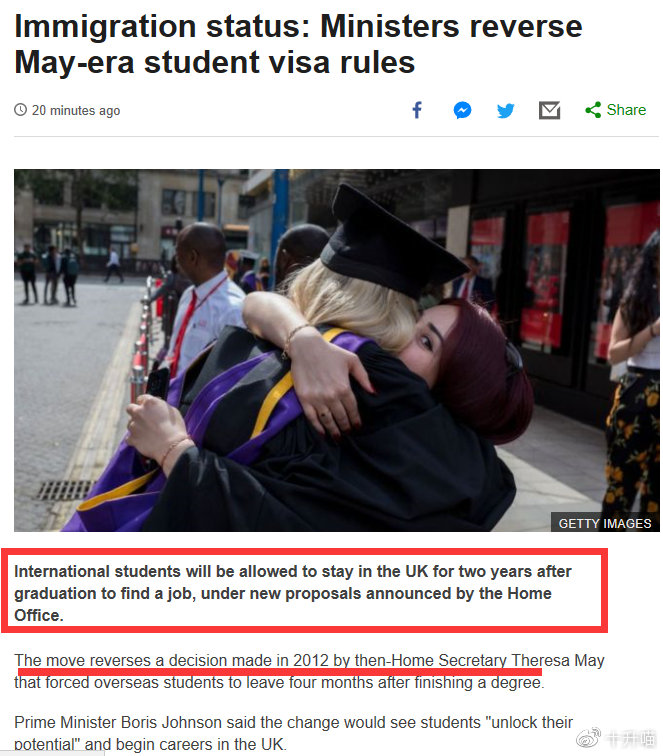
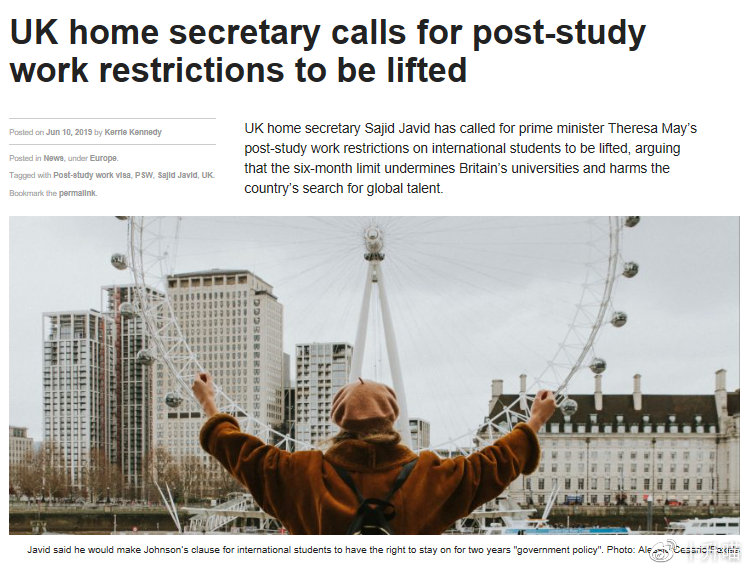
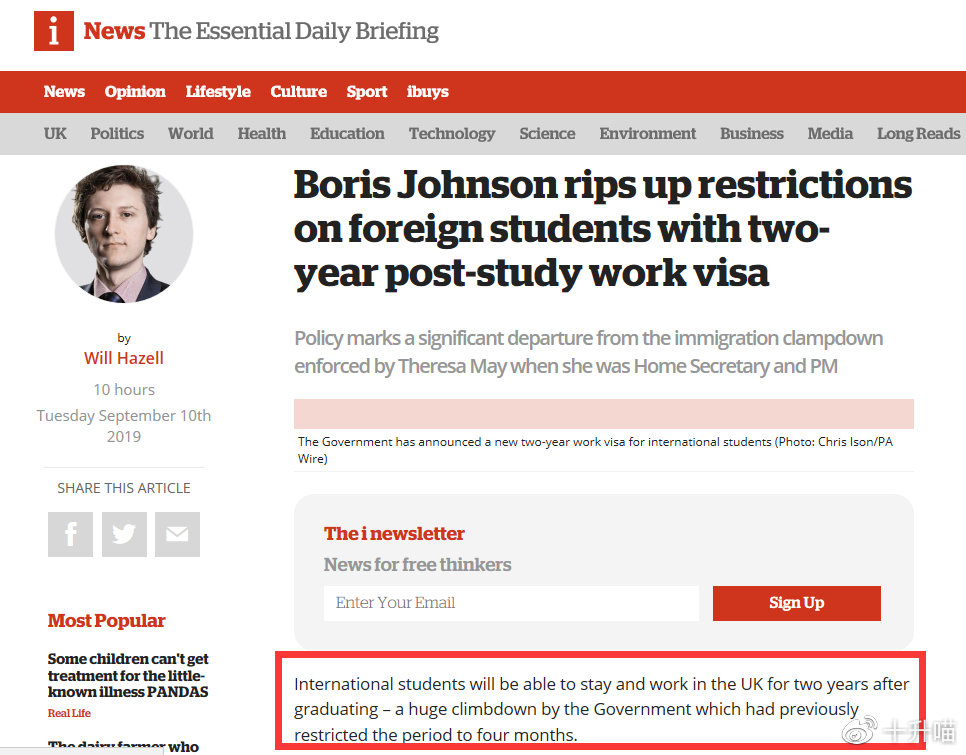

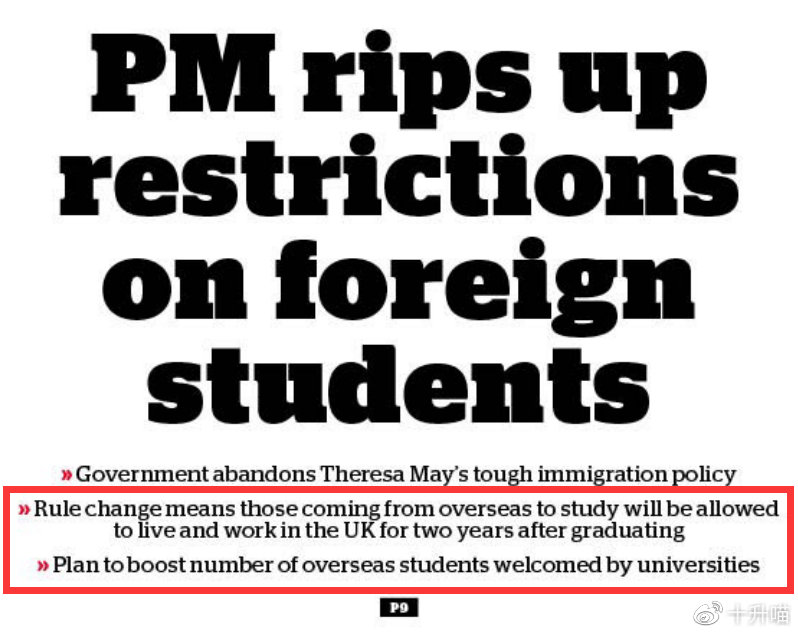
In regards to the PSW policy set to be implemented in 2021, UK Education Secretary Gavin Williamson and Home Secretary Priti Patel have explicitly stated that the UK government aims to encourage more international students to study in the UK and promote talent retention within the country. They have further outlined a plan to increase the number of international students coming to the UK by 30% by the year 2030.
Increasing the number of international students by 30% implies economic and labor force growth, highlighting the mutual benefits for both individuals and the country.
The evidence supporting the mutual benefits is illustrated in the following graph.:
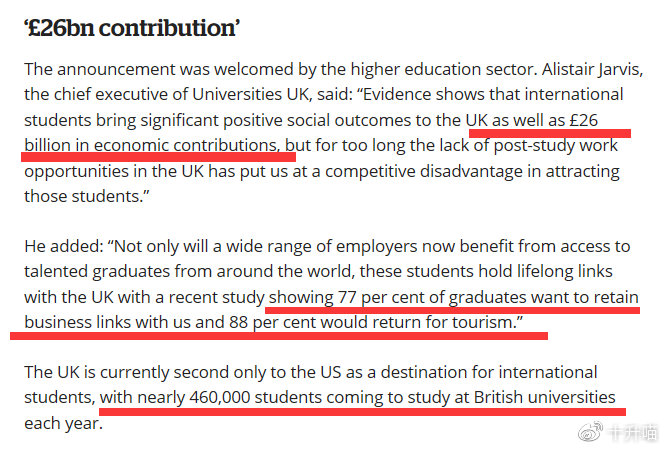
According to news reports from inews and BBC, international students studying in the UK have brought significant positive social outcomes. The UK is essentially the second-largest destination for international students, following closely behind the United States. Each year, nearly 460,000 international students come to study at UK universities. The positive outcomes of this engagement include a £26 billion economic contribution. UK employers highly value hiring talented graduates from around the world, which increases the labor force. Additionally, even if international students return to their home countries after graduating from UK universities, 88% of UK alumni visit the UK for tourism, contributing to the economy once again. Furthermore, 77% of UK graduates engage in business or maintain commercial connections with the UK.